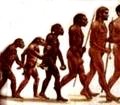PAST [Has life really been getting better?]
In looking at the current complexity of problems, we sometimes wonder if all this accelerating technological development and globalization is actually reducing our suffering and increasing our life satisfaction — or is it simply disrupting our lives and destroying the ecology of the planet. We often yearn for a long ago “simpler time”.
But we certainly do not want to go back 3 billion years to when the early denizens of planet earth were microscopic pre-bacteria awash in thousand foot tides and sizzling volcanoes. Nor back 300 million years to when we were instinct driven lizards snapping up millipedes. Nor back 30 million years to when our predecessors were early monkeys competing for fruit and sex and status. Nor back 3 million years when our chimp-brained ancestors ventured onto the Serengeti plains competing for roots and sex and status (with our face firmly up against timeless present). Nor even 300 thousand years ago when our brains had grown human sized and we used our budding language skills to compete with each other and Neanderthals for meat and sex and  status.
status.
But how about after we had finally evolved into modern humans with complex language skills and a sense of time and self. Was life better then?
Thirty thousand years ago, during the AE stage called Magic or tribal, life may have been simpler, but not easier. Life expectancy was in the teens and most of us did not survive childhood. Social ranking and rivalry within the tribe was complex and challenging — and tribes competed fiercely among themselves for territory and resources. Our shamans did indeed revere nature, but often led us in rites of human sacrifice or cannibalism when we made a successful raid on a neighboring tribe.
Three thousand years ago, during the stage called Mythic or ethnic-state, the new technology of plow agriculture allowed a man to produce a surplus of food that helped spawn a ruling class of priests and warriors, record keeping and writing, patriarchy, city-states, and god-kings. Most of us were slaves or serfs, but even ruling class life was highly constrained by preordained rules and roles — and restricted food variety and a lack of modern medicine kept life expectancy in the low twenties. Our priests were our connection to heavenly salvation and condemned cannibalism, but they also blessed the institutions of slavery, racism, religious war, and patriarchy.
Three hundred years ago, during the early Rational stage, industrialization was increasing productivity enough (in some areas of the world), to start generating a middle class and the ideas of democracy and eliminating slavery. But the oppression of poor, women, and non-ruling ethnic groups was still rampant. Childhood was still chancy, and childbirth or minor infections killed off adults, keeping life expectancy to the twenties or thirties. Both the priests of the old religions and the new “priests” of science and economics condemned slavery (bad economics), but still condoned patriarchy and racism.
Thirty years ago, during the middle Rational stage, improved technology and economic/political systems had increased productivity and communication to where hundreds of millions of people had a comfortable middle class lifestyle. And in the developing countries, the technology created “green revolution” and better medicine had started to reduced famines and extended the gift of life to billions. But prejudice still had free reign and the cold war threat of nuclear winter hung like the Sword of Damocles over all of the human race.









 Joey
is a squirming bundle of energy who, like other children of five, views
the world thru a magic-stage self-centered consciousness. For Joey, his
bite can make a tomato morph into a frog, and Kermit the frog is as
real as his sister, and his good behavior caused Santa to bring him a
bike, and his bad behavior (he unfortunately believes) caused Daddy to
leave him and Mommy.
Joey
is a squirming bundle of energy who, like other children of five, views
the world thru a magic-stage self-centered consciousness. For Joey, his
bite can make a tomato morph into a frog, and Kermit the frog is as
real as his sister, and his good behavior caused Santa to bring him a
bike, and his bad behavior (he unfortunately believes) caused Daddy to
leave him and Mommy. 
